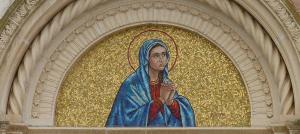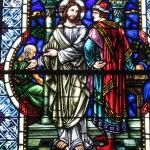
What we do in life is important. The way we live, the way we treat others, the way we treat the very earth itself matters. We might have eternity in our sight, but we must remember, time is a part of eternity. What we do matters, for it will help form our eternal existence. We cannot act as if nothing we do matters. We can’t say we seek after eternity as a way to ignore the problems of the present. Heaven and earth became one in the incarnation; the eschaton is immanent, and so we must live in the world understanding the interdependence between our earthly and eternal life.
Our body is important; it is a part of who and what we are. Every day it is being transformed, showing us its potential has not been actualized. In the resurrection, we will still have our body, but now it will be spiritualized, that is, it will be transformed so as to fulfill its potential (and through grace, become something even greater). All that we did will be incorporated in our resurrected body – it will always be a part of us, and that means, all the connections our body had with the rest of material creation will also have to have a part of our eternal existence. The whole material realm is an interdependent matrix, and so the resurrection of the body, with its spiritualization, will include a spiritualization of all matter.
Paul, realizing the value of our earthly lives, tells us we should live it out with wisdom, acting with righteousness, not letting evil get the best of us:
Take no part in the unfruitful works of darkness, but instead expose them. For it is a shame even to speak of the things that they do in secret; but when anything is exposed by the light it becomes visible, for anything that becomes visible is light. Therefore it is said, “Awake, O sleeper, and arise from the dead, and Christ shall give you light.” Look carefully then how you walk, not as unwise men but as wise, making the most of the time, because the days are evil. Therefore do not be foolish, but understand what the will of the Lord is (Eph. 5:11-17 RSV).
Wisdom, therefore, is important; we must engage it, taking the principles which we know, the principles revealed to us through Christ, and live them out in accordance to the situations we find ourselves in. Prudence does not mean we can reject principles we do not like; those principles must always be affirmed in and through our actions. They are to be incarnated, fit for the particular context in which they are realized. What we do in one situation will differ in another, not because the principles differ, but because different contexts will require different ways of dealing with and acting upon those principles.
Behind all our actions should remain the light of Christ, the light of truth, the light of love. We must make the most of our time. Our time is precious, because time and earthly life is precious. Those who would tell us otherwise, those who would make us think only eternity matters, are foolish, for they would try to convince us nothing we do here matters, whether we do good or evil. They do this so as to try to convince us to do whatever we want, to embrace our most inordinate passions such as greed, fulfilling all our innermost wishes without fear of any consequence; they say that because if what we do doesn’t matter, we might as well enjoy ourselves and do whatever we would like to do. Even if we harm others in the process, they say we shouldn’t care, because it doesn’t matter.
This is, of course, foolishness, because what we do matters, and everything which we do will be revealed. What we do in our temporal existence, what we make of ourselves in our lives, will form the basis of our eternal existence. Mary, the Theotokos, is the Theotokos because she gave birth to the God-man, Jesus Christ; it was a one event in history but it is also an eternal event, so that even after giving birth, she remained the Theotokos, the God-bearing virgin. If what happened in history did not matter, the incarnation would not have taken place, and Mary would not have become the Theotokos. Gnosticism is consistent with its rejection of the earthly realm, but in its consistency, it has become foolish, as it ignores the wisdom of God, the wisdom of God’s loving embrace, the wisdom which makes room for all things so that all things, including material beings, can and will have value as they receive a share of grace in eternity.
Jesus, therefore, also warns us that we must always be ready for the end. One day, we will die, and then we will experience the ramifications of our lives. We will see everything we did matters. Those who foolishly squandered their life away, selfishly seeking all that they can get for themselves in the world at the expense of others, will find that all they have taken from others comes at a price:
And he told them a parable, saying, “The land of a rich man brought forth plentifully; and he thought to himself, `What shall I do, for I have nowhere to store my crops?’ And he said, `I will do this: I will pull down my barns, and build larger ones; and there I will store all my grain and my goods. And I will say to my soul, Soul, you have ample goods laid up for many years; take your ease, eat, drink, be merry.’ But God said to him, `Fool! This night your soul is required of you; and the things you have prepared, whose will they be?’ So is he who lays up treasure for himself, and is not rich toward God” (Lk. 12:16-31 RSV).
We should embrace heaven as it touches the earth, and in doing so, follow the path of heaven, the path of selfless love. When we do this, we will live out our lives with prudence. What we establish and build up in and through such self-giving love will bring us (and many others) much grace and joy in eternity. We must take the greater portion and embrace heaven, but in doing so, we will find ourselves embracing the earth, for heaven embraces the earth. This is why, if and when we look to eternity, if and when we embrace heaven, we will not ignore the earth and the pains and sorrows which take place on it. We will establish, as it were, temples of God on earth, following the example of the Theotokos; then, through them, we will present the presence of God to the world, bringing the healing power of grace to the world. The more we build up such temples, places where God’s bountiful grace can be shared with all, the more we will become like Mary; we will be spiritually giving birth to Christ, letting the light of Christ shine that much more across the world, helping the sleepers, those still dead in their sins, to awake so that they can join in with us as we consecrate the world with God’s grace.
Let us not neglect our duty, our holy vocation (cf. 1 Ptr. 2:5), saying it doesn’t matter. It matters. What we do matters. God has made room for all creation so that it can and will have value. Let’s not undermine that value by suggesting otherwise.
Stay in touch! Like A Little Bit of Nothing on Facebook.
If you liked what you read, please consider sharing it with your friends and family!












